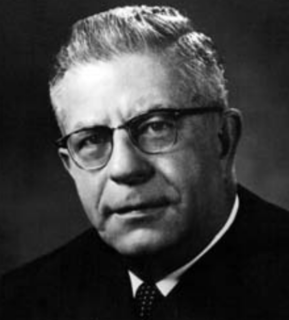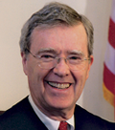Related Research Articles

William John Janklow was an American politician and member of the Republican Party who holds the record for the longest tenure as Governor of South Dakota: sixteen years in office. Janklow had the third-longest gubernatorial tenure in post-Constitutional U.S. history at 5,851 days.

Roger John Traynor was the 23rd Chief Justice of California (1964-1970) and an Associate Justice of the Supreme Court of California from 1940 to 1964. Previously, he also had served as a Deputy Attorney General of California under Earl Warren, and an Acting Dean and Professor of UC Berkeley School of Law. He is widely considered to be one of the most creative and influential judges as well as legal scholars of his time.

Diane Schwerm Sykes is the Chief United States Circuit Judge of the United States Court of Appeals for the Seventh Circuit and former Justice of the Wisconsin Supreme Court.

The South Dakota Supreme Court is the highest court in the state of South Dakota. It is composed of a chief justice and four associate justices appointed by the governor. One justice is selected from each of five geographic appointment districts. Justices face a nonpolitical retention election three years after appointment and every eight years after that. The justices also select their own chief justice.

David Gilbertson is chief justice of the South Dakota Supreme Court.
Robert Arthur Miller is a former chief justice of the South Dakota Supreme Court.

Jeffrey Stuart Sutton is a United States Circuit Judge of the United States Court of Appeals for the Sixth Circuit.

Diarmuid Fionntain O'Scannlain is a Senior United States Circuit Judge of the United States Court of Appeals for the Ninth Circuit. His chambers are located in Portland, Oregon.

The structure of the Government of South Dakota is based on that of the federal government, with three branches of government: executive, legislative, and judicial. The structure of the state government is laid out in the Constitution of South Dakota, the highest law in the state. The constitution may be amended either by a majority vote of both houses of the legislature, or by voter initiative.
Quill Corp. v. North Dakota, 504 U.S. 298 (1992), was a United States Supreme Court ruling, since overturned, concerning use tax. The decision effectively prevented states from collecting any sales tax from retail purchases made over the Internet or other e-Commerce route unless the seller had a physical presence in the state. The ruling was based on the Dormant Commerce Clause, preventing states from interfering with interstate commerce unless authorized by the United States Congress. The case resulted from an attempt by North Dakota seeking to collect sales tax on licensed computer software offered by the Quill Corporation, an office supply retailer with no North Dakota presence, that allowed users to place orders directly with Quill.

The University of South Dakota School of Law also known as University of South Dakota Knudson School of Law or USD Law in Vermillion, South Dakota, United States, is a professional school of the University of South Dakota and the only law school in the state of South Dakota. Established in 1901, by U.S. Ambassador Bartlett Tripp and U.S. Senator Thomas Sterling. The law school is home to approximately 168 students and has more than 3,000 alumni. With 168 J.D. candidates, it is currently the second-smallest law school and smallest public law school student population among the American Bar Association accredited law schools.
Poe v. Seaborn, 282 U.S. 101 (1930), was a United States Supreme Court case in which the Court held that a married person's income may be divided with his spouse in a community property state for purposes of U.S. federal income taxation. The Seaborns were residents of the State of Washington, a community property state, and each reported one-half of Mr. Seaborn's salary and other sources of income on their separate income tax returns. The Collector of Internal Revenue determined that the entire income should have been reported in Mr. Seaborn's return. The district court ruled in favor of Mr. Seaborn, and the Supreme Court affirmed. In doing so, the Court distinguished Lucas v. Earl, in which the Court disallowed income splitting by entering into a contract with one's wife, by noting that the earnings in Mr. Seaborn's case are property of the community by state law. In 1948, the United States Congress responded to the different treatment of married taxpayers in community property states and non-community property states by allowing all married couples to take advantage of the "income splitting" joint return.
Lori S. Wilbur is a former Justice of the South Dakota Supreme Court.

Marty J. Jackley is an American attorney who was the 30th Attorney General of South Dakota from 2009 to 2019. He previously served as the 39th United States Attorney for the District of South Dakota.
Direct Marketing Association v. Brohl, 575 U.S. ___ (2015), was a United States Supreme Court case in which the Court held that a lawsuit by the Direct Marketing Association trade group about a Colorado law regarding reporting the state's tax requirements to customers and to the Colorado Department of Revenue is not barred by the Tax Injunction Act. While the case was reheard and found in favor of Colorado, the concurrence of Justice Anthony Kennedy provided a means for states to bring a challenge the ruling of Quill Corp. v. North Dakota, which has prevented states from collecting taxes from out-of-state vendors.

Randolph John Seiler is an American attorney and Vietnam veteran who served as the 41st United States Attorney for the District of South Dakota from 2015 until his retirement in 2017. Seiler was previously the Deputy United States Attorney for the District of South Dakota.
Jon J. Jensen is an American lawyer and judge, who is the chief justice of the North Dakota Supreme Court. He previously served as a district court judge in North Dakota from 2013 to 2017.
South Dakota v. Wayfair, Inc., 585 U.S. ___ (2018), was a United States Supreme Court case in which the court held by a 5–4 majority that states may charge tax on purchases made from out-of-state sellers, even if the seller does not have a physical presence in the taxing state. The decision overturned Quill Corp. v. North Dakota (1992), which had held that the Dormant Commerce Clause barred states from compelling retailers to collect sales or use taxes in connection with mail order or Internet sales made to their residents unless those retailers have a physical presence in the taxing state.
Mark E. Salter is an American attorney, veteran, and current Associate Justice of the South Dakota Supreme Court, appointed by Governor Dennis Daugaard in 2018. He became the 51st member of the court.
South Dakota v. Fifteen Impounded Cats, 785 N.W.2d 272, is a 2010 Supreme Court of South Dakota civil forfeiture case brought by the American state of South Dakota against fifteen cats that they had seized on the grounds of interfering with a driver's visibility. The seizure was challenged by the owner of the cats and the court found on a 3–2 majority that the seizure was lawful because of the risk to pedestrians as well as to the cats.
References
- ↑ South Dakota Codified Laws. West. pp. SD Sup Ct Rule 3 (1973), SDCL 16-16-6.1 (1983 Supp) (amended by 1983 SD Sess Laws ch 398 (Supreme Court Rule 82-25), repealed by 1987 SD Sess Laws ch 406 (Supreme Court Rule 86-32)).
- ↑ "Biography" . Retrieved September 4, 2013.
- ↑ Note, Recent Case: South Dakota Supreme Court Holds Unconstitutional State Law Requiring Internet Retailers Without In-State Physical Presence to Remit Sales Tax , 131 Harv. L. Rev. 2089 (2018).
- ↑ Note, The Supreme Court, 2017 Term — Leading Cases , 132 Harv. L. Rev. 277 (2018).
- ↑ Hult, John (2017-12-19). "Justice Severson to retire from South Dakota Supreme Court". Argus Leader. Retrieved 2018-07-22.